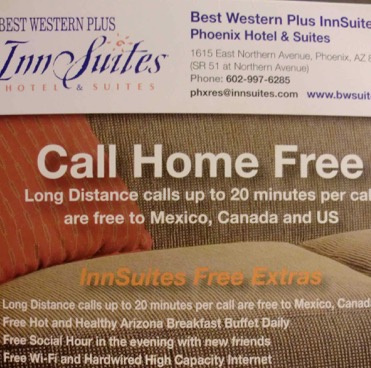Telecom Too Cheap to Meter

Long time readers of this blog may recall an early post on the rapidly declining cost of telecom within the memory of some of us. When I started working at FCC in September 1979 the cost of long distance rates was a major issue and the prime justification for the restructuring of AT&T and the telecom industry.
The “too cheap to meter” phrase come from an address by US Atomic Energy Commission Chairman Lewis L. Strauss to the National Association of Science Writers in New York on September 16, 1954 where he said, "It is not too much to expect that our children will enjoy in their homes electrical energy too cheap to meter.” The original context of this phrase is controversial and somewhat unclear. Our sister blog, Nuke Power Talk, has written today in more detail about the origins and controversy of Chmn. Strauss’ quote.
Last week we were in Phoenix for a family event and were surprised to see the flier shown above in the room. Rates for telephone calls from hotel rooms used to be a large issue at FCC and a source of many consumer complaints. This resulted in the adoption of Subpart O of Part 64 which did not solve the problem, but at least gave more information to the consumer. When I was in the Enforcement Bureau’s predecessor, a recurring activity was sending agents to hotels across the country to confirm that guests were given the information required by Part 64.
Free Wi-Fi has now become common at hotels although, oddly, expensive hotels often charge up to $20/night for Wi-Fi. One wonders why Motel 6 can give it away and $300/night hotels have to charge extra! An iPod with Skype installed and an under $20 microphone/earpiece attachment can convert a Wi-Fi signal to use for a telephone call. This is especially cost-effective when outside the US and calling home since international cellular calling rates suffer from a severe case of market failure and regulatory apathy in all countries. (In some countries, prepaid calling cards offer a cost-effective way to call home. But they may be hard to find and difficult to use for the language challenged.)
Free local calls has become a recurring feature at hotels in recent years. But the Phoenix hotel above is the first hotel I have seen with both free long distance and free calls to Canada and Mexico (as long as they are under 20 minutes). This is further confirmation that the marginal cost of landline telephone calls in the era of broadband is really “too cheap to meter”.
The economics of mobile communications are clearly very different from landline systems with higher fixed costs for spectrum procurement and base station construction. But the information rate of voice calls is getting to be a small fraction of the overall volume in bits of mobile networks and one wonders when the day will come when the mobile industry will also conclude that voice telecom is also “too cheap to meter”? That day is not yet here, but with the changes in technology and the mobile market it may come soon.



![Validate my RSS feed [Valid RSS]](valid-rss-rogers.png)

